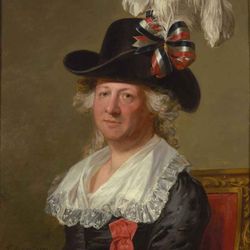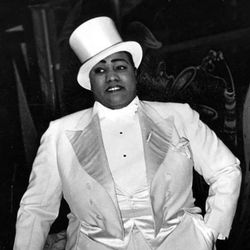Pre-Stonewall
All Episodes

King James VI/I and His Early Love Life
16:15|This is Part 1 of a two-part series. King James VI of Scotland and I of England is mainly famous today for giving his name to an English translation of the Bible still held as sacrosanct by many conservative Christians. Yet he is also one of the rare examples of a man in pre-modern European history who unambiguously preferred romantic and sexual relationships with men.Bergeron, David M. King James and Letters of Homoerotic Desire (Iowa City: University of Iowa Press, 1999).Croft, Pauline. King James (Basingstoke: Palgrave Macmillan, 2003).Young, Michael B. James VI and the History of Homosexuality (Basingstoke: Palgrave, 2000).Support Me on Patreonhttps://www.patreon.com/chadsdentonYou can also drop some change in the tip jar and see my other work here.
5. The Chevalier d'Eon
24:23||Season 1, Ep. 5The Chevalier d'Eon was a diplomat and spy who made the perplexing decision to declare that she had always been a woman in a time when women were legally and socially marginalized. Her story took her through the halls of power, to defying the monarchy of France itself, and to becoming an international celebrity who fought fencing duels in London.Sources:Clark, Anna. 'The Chevalier d'Eon and Wilkes: masculinity and politics in the eighteenth century', Eighteenth-Century Studies, 32.1 (1998): 19–48.Kates, Gary. Monsieur d'Eon is a Woman: A Tale of Political Intrigue and Gender Masquerade (Baltimore: Johns Hopkins University Press, 2001).Support Me on Patreonhttps://www.patreon.com/chadsdentonYou can also drop some change in the tip jar and see my other work here.
4. Seth Versus Horus
19:16||Season 1, Ep. 4In the story of the epic rivalry between the gods Horus and Seth, there is one rather risqué chapter that may have a lot to say about what the ancient Egyptians thought of same-sex love.Sources:"The Contendings of Horus and Seth" from The Chester Beatty Papyrus 1, translator unknown. https://courses.missouristate.edu/ECarawan/HorusSeth.htm#:~:text=Seth%20returned%20according%20to%20his,I'll%20do%20so.%22 Jerkins, Morgan. "Lettuce and Kings: The Power Struggle Between Horus and Seth." MQR. https://sites.lsa.umich.edu/mqr/2015/05/lettuce-and-kings-the-power-struggle-between-horus-and-set-2/Manniche, Lisa. Sexual Life in Ancient Egypt (London: Kegan Paul, 2002). Smith, K. Annabelle. "When Lettuce Was a Sacred Sex Symbol." https://www.smithsonianmag.com/arts-culture/when-lettuce-was-a-sacred-sex-symbol-12271795/?no-ist Watterson, Barbara. Gods of Ancient Egypt (Stroud: Sutton Publishing, 1998). The episode of History of Egypt podcast mentioned in the episode:https://www.egyptianhistorypodcast.com/192-the-trouble-with-seth/
3. Gladys Bentley
15:33||Season 1, Ep. 3PS: Pre-Stonewall returns with the story of Gladys Bentley. She was an irreverent icon of the Harlem Renaissance, who performed her act and went around in public dressed in men's clothing and even claimed to have married a woman. Later in the more puritanical atmosphere of the United States in the 1950s, though, she published an article claiming her homosexuality had been cured. But how sincere was she? Sources:Bentley, Gladys. "I am a Woman Again." Ebony Magazine 2.10 (1952): 92-95. Jones, Regina V. "How Does A Bulldagger Get Out of the Footnote? Or Gladys Bentley's Blues." Ninepatch: A Creative Journal for Women and Gender Studies 1, no. 1 (2012): 31-48.Turner, Joyce Moore and Turner, W. Burghardt. Caribbean Crusaders and the Harlem Renaissance (Urbana: University of Illinois Press, 2005).
2. The Male Nun of Dark Ages Gaul
12:51||Season 1, Ep. 2In the French city of Poitiers during the sixth century, two nuns led a violent revolt against their own abbess. Brought to trial, there is one particular star witness who is mentioned almost incidentally: a man who dresses like a nun.Sources:Gregory of Tours. History of the Franks, trans. Lewis Thorpe (New York: Penguin Books, 1976).Guy Halsall, "Material Culture, Sex, Gender, Sexuality And Transgression In Sixth-Century Gaul" in Halsall, Cemeteries and Society in Merovingian Gaul (Leiden: Brill, 2010), 323-355.
1. Galba
16:01||Season 1, Ep. 1The sixth emperor to rule Rome, Galba was the first emperor of Rome not to be related to Julius Caesar or the Claudian clan to reign. A good, old-fashioned Roman, according to the Roman historians Galba nonetheless flaunted Roman sensibilitites by allegedly preferring manly men.Tip jar: https://www.paypal.com/donate/?business=CGT7WU5C2BG9J&no_recurring=0¤cy_code=USDSupport the show on Patreon: https://www.patreon.com/chadsdentonSources:Suetonius, "Galba" and "Otho" from Twelve CaesarsPlutarch, "Life of Galba" from Parallel LivesGwyn Morgan, 69 A.D.: The Year of Four Emperors
loading...